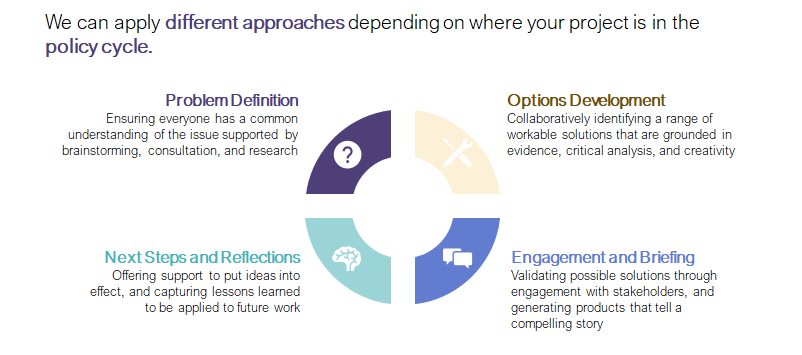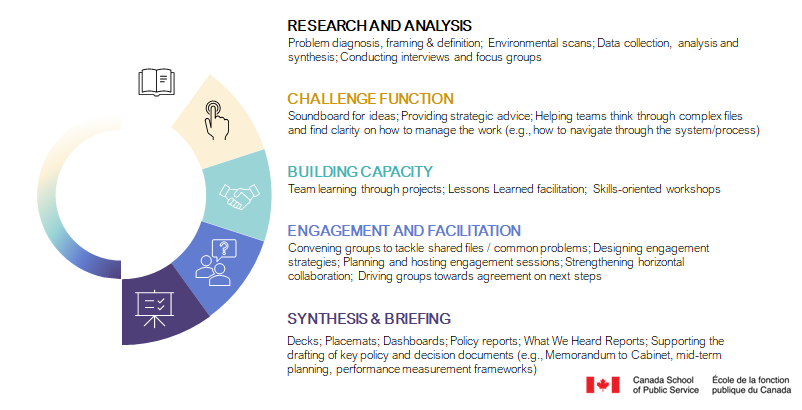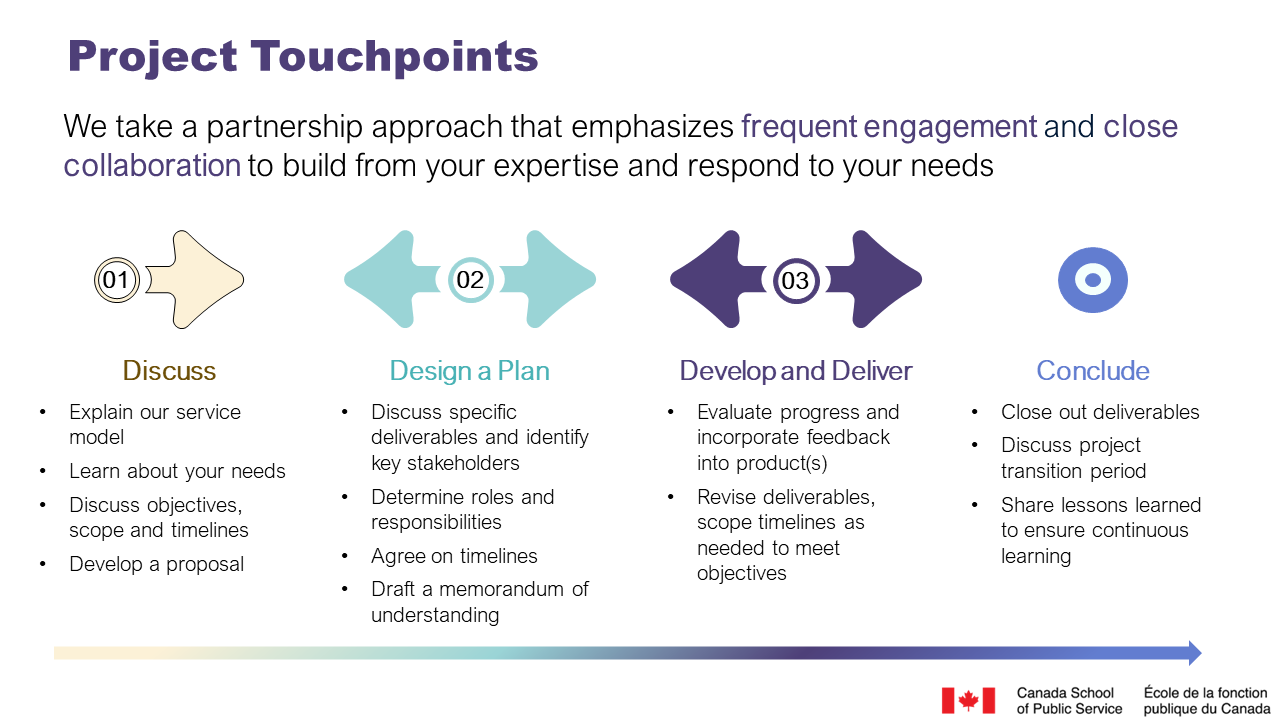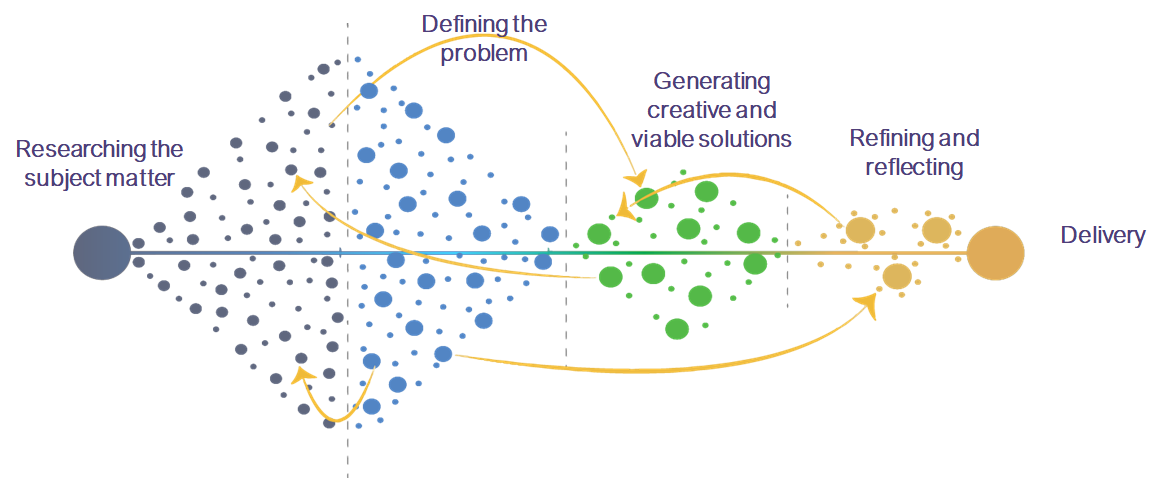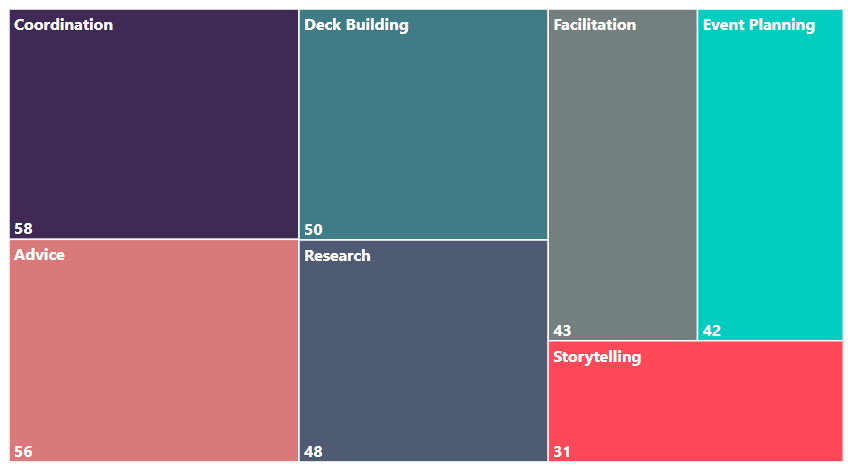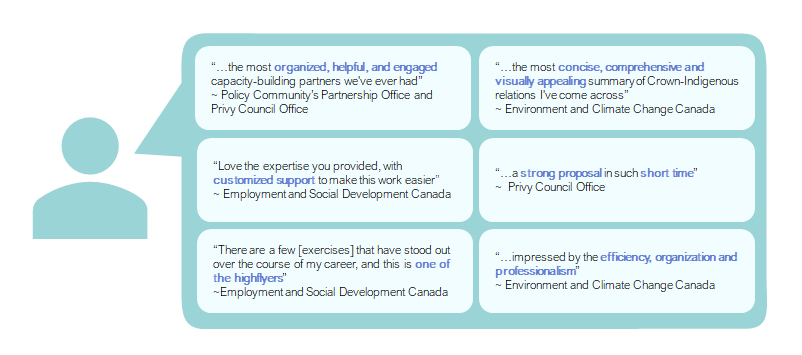Important: The GCConnex decommission will not affect GCCollab or GCWiki. Thank you and happy collaborating!
Difference between revisions of "Ankita"
John.ryan21 (talk | contribs) |
John.ryan21 (talk | contribs) |
||
| (24 intermediate revisions by the same user not shown) | |||
| Line 21: | Line 21: | ||
=='''<big><big><big>The Surge Team</big></big></big>'''== | =='''<big><big><big>The Surge Team</big></big></big>'''== | ||
| − | <big><big>Established | + | <big><big>Established at the Canada School of Public Service in late 2018, the Surge Team supports policy projects where quick action or breakthroughs are needed. We do not have ongoing files. Instead, the team collaborates with partners on time-limited projects at the School and across the federal public service.</big> |
| − | + | <br> | |
| − | <big>In all of our work we emphasize clear problem definition and rigorous analysis. We often play the role of a neutral third party or challenge function to help to our partners identify desired outcomes and outputs. | + | <br> |
| − | + | <big>In all of our work we emphasize clear problem definition and rigorous analysis. We often play the role of a neutral third party or challenge function to help to our partners identify desired outcomes and outputs. To achieve these outcomes, our team of policy professionals has a range of experiences, perspectives, skills, and toolsets that help us deliver on partners' needs, including deliverables such as policy briefs, decision documents, presentations, and facilitated sessions. </big> | |
| − | + | <br> | |
| − | + | <br> | |
| − | + | <big>To learn more about us and our work reach out at surgesolutionsunit@csps-efpc.gc.ca or visit our [https://gcxgce.sharepoint.com/teams/1000611/ '''GCXchange Site'''] for more details. Our [https://gcxgce.sharepoint.com/teams/1000611/ GCXchange site] also contains a series of [https://gcxgce.sharepoint.com/teams/1000611/SitePages/Past-Surge-Projects.aspx '''Learning Materials'''] and [https://gcxgce.sharepoint.com/teams/1000611/SitePages/About-us.aspx '''Resources'''], which offer tips and lessons learned on core aspects of policy work.</big></big> | |
| − | <big>To learn more about us and our work reach out at surgesolutionsunit@csps-efpc.gc.ca or visit our [https://gcxgce.sharepoint.com/teams/1000611/ ''' | + | <br> |
| + | <br> | ||
==<div id="How We Can Help">'''<big><big>How We Can Help</big></big>'''== | ==<div id="How We Can Help">'''<big><big>How We Can Help</big></big>'''== | ||
| Line 34: | Line 35: | ||
{| | {| | ||
|- | |- | ||
| − | | <big><big>'''We meet our partners where they're | + | | <big><big>'''We meet our partners where they're at''' - whether it's collaborating on a project from day one or helping push a file over the finish line.</big>|| [[File:Jump_in.png|alt=|left|middle|frameless|upright=3]] |
|- | |- | ||
| − | |<big><big>'''We offer a range of policy services''', from | + | |<big><big>'''We offer a range of policy services''', from research and analysis to engagement and facilitated sessions to synthesis and briefing documents for decision-makers.</big> || [[File:Research_and_Services.png|alt=|left|middle|frameless|upright=3]] |
|} | |} | ||
| Line 44: | Line 45: | ||
|- | |- | ||
| − | | <big><big>Our approach is '''most effective with engaged and collaborative partners''': we use regular touchpoints throughout the project to build off your expertise and respond to your needs.</big></big> || [[File:Working with partners1.png|center|frameless|upright= | + | | <big><big>Our approach is '''most effective with engaged and collaborative partners''': we use regular touchpoints throughout the project to build off your expertise and respond to your needs.</big></big> || [[File:Working with partners1.png|center|frameless|upright=3]] |
|- | |- | ||
| − | | <big><big>As a team, '''we work in a series of short sprints and deep dives''' to improve the quality of products. Our work is '''iterative''' and '''collaborative''', learning equally from failures and successes. Consulting with stakeholders is a critical part of how we do our work. '''Our projects are often non-linear''', redefining problem statements and generating more research as we move forward and change course as needed.</big></big> || [[File:Approaching work.png|frameless|upright=2| | + | | <big><big>As a team, '''we work in a series of short sprints and deep dives''' to improve the quality of products. Our work is '''iterative''' and '''collaborative''', learning equally from failures and successes. Consulting with stakeholders is a critical part of how we do our work. '''Our projects are often non-linear''', redefining problem statements and generating more research as we move forward and change course as needed.</big></big> || [[File:Approaching work.png|frameless|upright=3|center|]] |
| + | |} | ||
| + | |||
| + | |||
| + | {| width="100%" cellpadding="10" cellspacing="15px" | ||
| + | |||
| + | |- valign="top" | ||
| + | | style="border-left: 10px solid #485B83; box-shadow: 0 4px 8px 0 rgba(0, 0, 0, 0.2), 0 6px 15px 0 rgba(0, 0, 0, 0.19); color: black; background-color: white; font-size:1.0em;" | | ||
| + | {| | ||
| + | |+ | ||
| + | | | ||
| + | === Planifiez votre carrière === | ||
| + | |||
| + | |||
| + | Étudiants GC, le programme de développement de l'apprentissage et de la vaste initiative universitaire (DAVIU) et le Réseau des jeunes fonctionnaires fédéraux (RJFF) sont heureux de vous inviter à leur événement sur la planification de carrière pour les étudiants et les diplômés. | ||
| + | |||
| + | |||
| + | Cette session, intitulée "Planifiez votre carrière", vous informera sur des sujets liés aux ressources humaines (RH) tels que les processus de nomination, l'intégration des étudiants (Student Bridging), les types d'emploi, les conseils pour trouver un emploi et une multitude d'outils pour poursuivre votre apprentissage. | ||
| + | |||
| + | * '''Enregistrement en français :''' https://lnkd.in/euf5Jz6v | ||
| + | * '''Enregistrement en anglais :''' https://lnkd.in/e9kGHNsC | ||
| + | |[[File:Planifiez votre carriere.png|alt=Planifiez votre carriere|thumb|Planifiez votre carriere]] | ||
| + | |} | ||
| + | |||
|} | |} | ||
| + | |||
| + | |||
| + | |||
| + | |||
=='''<big>Who We've Helped</big>'''== | =='''<big>Who We've Helped</big>'''== | ||
| Line 121: | Line 149: | ||
==='''<big>Testimonials:</big>'''=== | ==='''<big>Testimonials:</big>'''=== | ||
| − | [[File: | + | [[File:Feed_back.png|alt=|frameless|upright=3]] |
==<div id="FAQ">'''<big><big>FAQ</big></big>'''== | ==<div id="FAQ">'''<big><big>FAQ</big></big>'''== | ||
| + | '''<big>How many projects does Surge normally take on?</big>''' | ||
| + | |||
| + | <big>Typically, 2-4 projects at any given time, with start and end-dates staggered.</big> | ||
| + | |||
| + | '''<big>What is the average duration of a project? How many analysts work on a project?</big>''' | ||
| + | |||
| + | <big>Projects usually last from 2 to 8 months. A project team will typically include 3-5 analysts. We do not 'loan out' analysts to departments, unlike the Free Agent Program.</big> | ||
| + | |||
| + | '''<big>How does the cost sharing approach to projects work?</big>''' | ||
| + | |||
| + | <big>CSPS and the partner department sign an MOU outlining costs, roles, timelines and deliverables. Costs are based on analysts' hourly wages and any additional O&M costs, if applicable (e.g., costs to hire an external speaker).</big> | ||
| + | |||
| + | <big>All partner projects are cost-shared - CSPS takes on a certain portion of the project costs (based on discussions and agreement with partners). Funds are collected through an Interdepartmental Settlement, typically from partners' O&M budgets.</big> | ||
| + | <big>'''How long does the MOU take to put in place?'''<br />We can normally draft and share an MOU quickly (1-2 weeks), after scope, timelines, and deliverables have been discussed and agreed upon.</big> | ||
| − | ==<div id="Contact">'''<big>Contact Us</big>'''== | + | ==<div id="Contact">'''<big><big>Contact Us</big></big>'''== |
| − | <big>If you are interested in working with us | + | <big>If you are interested in working with us or want to learn more about what we do reach out to us at surgesolutionsunit@csps-efpc.gc.ca or visit our [https://gcxgce.sharepoint.com/teams/1000611/ GCXchange site].</big> |
|} | |} | ||
Latest revision as of 15:49, 5 April 2023
| How We Can Help | How We Work | Who We've Helped | FAQ | Contact Us |
|---|
The Surge TeamEstablished at the Canada School of Public Service in late 2018, the Surge Team supports policy projects where quick action or breakthroughs are needed. We do not have ongoing files. Instead, the team collaborates with partners on time-limited projects at the School and across the federal public service.
|
| We meet our partners where they're at - whether it's collaborating on a project from day one or helping push a file over the finish line. | |
| We offer a range of policy services, from research and analysis to engagement and facilitated sessions to synthesis and briefing documents for decision-makers. |
How We Work
| Our approach is most effective with engaged and collaborative partners: we use regular touchpoints throughout the project to build off your expertise and respond to your needs. | |
| As a team, we work in a series of short sprints and deep dives to improve the quality of products. Our work is iterative and collaborative, learning equally from failures and successes. Consulting with stakeholders is a critical part of how we do our work. Our projects are often non-linear, redefining problem statements and generating more research as we move forward and change course as needed. |
|
Who We've Helped
| Since December 2018, we have worked with several organizations to deliver over 50 projects with more than 150 individual deliverables. You can find details on these projects, as well as lessons we've learned from them, on our GCXchange site.
Our projects touch on many policy areas, including public administration and machinery of government, Indigenous relations, national security, social policy, and innovation, among others. |
Examples of Projects:
| Online Transition Planner and Checklist: A tool to support Government transition
Partnership with the Privy Council Office Centralized a checklist of tasks to be completed for all incoming and outgoing Ministers, staff, and offices Deployed a Software-as-a-Service (SaaS) tool across the GC Provided an enterprise-wide view of transition activities for the Privy Council Office | |
|
| |
| Behavioural Insights Blended Services Pilot: Facilitated Workshop Learning
Partnership with the Policy Community Partnerships Office, Privy Council Office, and Behavioural Insights Team Applied a team-based learning-by-doing approach to teach public servants about Behavioral Insights and make concrete progress on real problems Combined expert-led training and one-on-one support to develop BI-based interventions for real world challenges | |
|
| |
| Reconciliation Primer: Policy Brief and Learning Tool
Partnership with Health Canada Primer for public servants on the need for reconciliation and the role they can play Developed in consultation with Indigenous public servants and policy experts Content contributed to the app Reconciliation: A Starting Point | |
|
| |
| Modern Public Engagement: Facilitated Discussions and Engagement Framework Development
Partnership with Transport Canada Curation of tools and resources relevant to public engagement that will support TC's Transformation Plan Provides a public engagement framework in prototype format that articulates 5 broad phases of engagement and explores best practices |
Testimonials:
FAQ
How many projects does Surge normally take on?
Typically, 2-4 projects at any given time, with start and end-dates staggered.
What is the average duration of a project? How many analysts work on a project?
Projects usually last from 2 to 8 months. A project team will typically include 3-5 analysts. We do not 'loan out' analysts to departments, unlike the Free Agent Program.
How does the cost sharing approach to projects work?
CSPS and the partner department sign an MOU outlining costs, roles, timelines and deliverables. Costs are based on analysts' hourly wages and any additional O&M costs, if applicable (e.g., costs to hire an external speaker).
All partner projects are cost-shared - CSPS takes on a certain portion of the project costs (based on discussions and agreement with partners). Funds are collected through an Interdepartmental Settlement, typically from partners' O&M budgets.
How long does the MOU take to put in place?
We can normally draft and share an MOU quickly (1-2 weeks), after scope, timelines, and deliverables have been discussed and agreed upon.
Contact Us
If you are interested in working with us or want to learn more about what we do reach out to us at surgesolutionsunit@csps-efpc.gc.ca or visit our GCXchange site.

